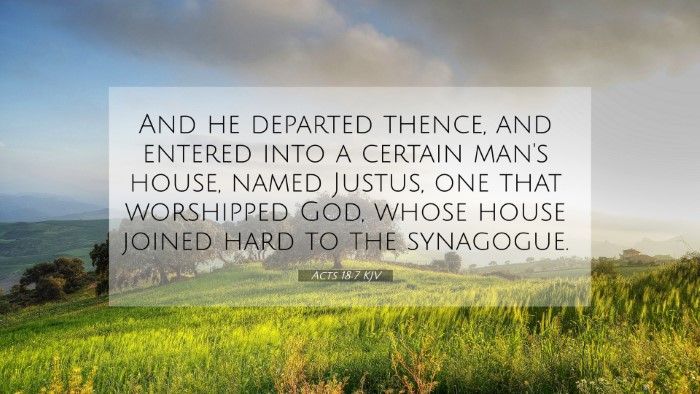Understanding Acts 18:7
Acts 18:7 states: "And he departed thence, and entered into a certain man's house, named Justus, one that worshipped God, whose house joined hard to the synagogue."
This verse illustrates a significant moment in the ministry of the Apostle Paul, during which he redirects his efforts towards a new foundation of support amidst opposition in Corinth. Here, we explore its meaning through various commentaries and cross-references.
Summary of Commentary Insights
Matthew Henry's Commentary
Matthew Henry emphasizes the importance of Justus' house as a refuge for Paul. He notes that this location not only provided shelter but also became a gathering place for believers. The mention of Justus being a worshipper of God indicates a welcoming environment for the teachings of Christianity. This shifts the focus of Paul’s ministry, highlighting the necessary transitions he made in response to local hostility.
Albert Barnes' Commentary
Albert Barnes points out that Justus was likely a Gentile who worshipped the God of Israel, reflecting the inclusivity of the early Christian community. Barnes highlights how Justus' proximity to the synagogue symbolizes the bridge between Jewish tradition and the new Christian faith, suggesting that the early church was rooted in Jewish customs even as it expanded to include Gentiles.
Adam Clarke's Commentary
Adam Clarke provides insight into the geographical and cultural context of this encounter. He explains that Justus’ house being next to the synagogue speaks to the intermingling of communities and the challenges that Paul faced. Clarke notes that finding a place in such close quarters allowed for further ministry to both Jews and Gentiles, reinforcing the mission of spreading the Gospel to all.
Key Themes in Acts 18:7
- Transition in Ministry: Acts 18:7 marks a shift in Paul's approach to spreading the Gospel.
- Welcoming Spaces: Justus’ home symbolizes the welcoming nature of early Christian communities.
- Bridging Cultures: The relationship between Jewish traditions and Gentile believers is evident.
- Courage in Adversity: Paul’s resilience in the face of opposition highlights his commitment.
Related Bible Cross-References
- Acts 18:1: Describes Paul’s arrival in Corinth and the establishment of his ministry there.
- Acts 17:34: Discusses the conversion of various individuals amidst opposition, showcasing God’s faithful converts.
- Romans 16:23: Mentions Gaius, who is thought to be Justus, indicating a strong connection between the calling and support structures Paul created.
- 1 Corinthians 1:14: Alludes to the early converts in Corinth, emphasizing the spread of the Gospel.
- Acts 18:8: Further expands on the results of Paul’s new ministry setting.
- Philippians 1:5: Reflects on fellowship in the Gospel, with echoes of community support.
- John 4:35: Highlights the importance of recognizing ripe opportunities for harvest in ministry.
- Matthew 10:14: Discusses shaking the dust off one's feet, echoing Paul's need for a supportive environment.
Exploratory Insights on Cross-Referencing
Understanding Acts 18:7 through the lens of cross-referencing biblical texts opens a broader understanding of inter-Biblical dialogue and thematic connections:
- Identifying Connections: Through cross-referencing, one can draw thematic similarities between Paul's experiences and the teachings found in both the Old and New Testaments.
- Studying Context: Using tools like a Bible concordance can help in identifying connections, such as correlating Paul's ministry style to the prophetic traditions of the Old Testament.
- Comparative Analysis: Comparative studies of Pauline epistles help clarify Paul's intentions and challenges faced in Acts.
- Enriching Sermon Preparation: Cross-references strengthen sermon themes, which can lead to deeper congregational insights.
Conclusion
Acts 18:7 serves as a rich narrative of Paul's resilience, illustrating the need for supportive community during difficult times. The interactions he established, particularly in the home of Justus, highlight the early efforts in bridging cultures and maintaining faith amid adversity. By utilizing cross-referencing methods, one can draw from the broader biblical narrative, enriching both personal faith and communal understanding.








